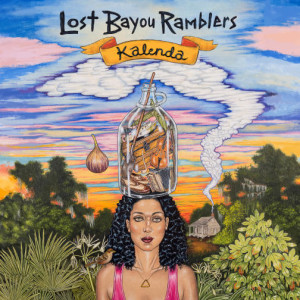 You know that moment when you hold your breath as you start up a record by a group whose previous record is one of your favorites ever, and you hope this new one is still just as great and maybe even greater, and that they haven’t gone off in some weird direction or had some change in personnel that wrecked their whole sound?
You know that moment when you hold your breath as you start up a record by a group whose previous record is one of your favorites ever, and you hope this new one is still just as great and maybe even greater, and that they haven’t gone off in some weird direction or had some change in personnel that wrecked their whole sound?
Well, queue up that feeling, because I’m queuing up Kalenda, the new one from Lost Bayou Ramblers, whose 2012 album Mammoth Waltz is one of the weirdest and greatest Cajun records ever …
And, have no fear, because from the very first track “Sabine Turnaround,” Lost Bayou Ramblers still sound like nothing else you’ve ever heard. Those vocals by founding member Louis Michot could’ve been recorded in somebody’s backyard by Alan Lomax 50 years ago, but they’re backed by what sounds like an ensemble auditioning for a gig as house band in the Mos Eisley Cantina on Tattooine!
The Ramblers are Louis Michot on fiddle and vocals; Andre Michot on accordion and occasionally lap steel guitar; Eric Heigle on drums; Korey Richey on bass, synth bass, and production; Jonny Campos on guitar, pedal steel and “tape manipulation.” Everybody does more than one or even two things, and there are several guest musicians helping out on everything from guitars to tin whistle, cello, saxophone and all kinds of percussion.
If you love Cajun music, well, that’s no guarantee that you’ll love Lost Bayou Ramblers’ version of it. “Perversely progressive” is a nice description of it that turned up in their promotional material. Well, here’s the whole quote, because it says it better than I might: “Lost Bayou Ramblers’ evolution as a perversely progressive band rooted in Cajun traditions continues to excite, challenge, and redefine both genre expectations as well as cultural preconceptions.”
It’s probably best to deal with the title track first, even though it’s the penultimate song on the album. It’s yet another version in the continuing saga of one of the most important songs ever to come out of Louisiana. “Kalenda” has become “Colinda” and many other variations in its journey from Africa through the Caribbean to that great crossroads New Orleans, where what was originally a rhythm became a dance, became a folk song, a country song, then a rock and roll song and is now a standard in the Creole/Cajun repertoire wherever it is played. This one is based on a newly discovered recording from the 1930s now housed in the University of Texas archives alongide the Lomax archives. It’s billed as a lullaby and just has two short verses that mock a gentleman named Etienne Mazureau, who was a prominent lawyer in Louisiana during the transition from French to American rule. M. Mazureau appears in the journals of Alexis de Tocqueville, where he is quoted as believing that white people need African slaves in the American South because whites are constitutionally incapable of working hard in the tropical heat.
Thus in this version, alternating with the refrain of “Dansez Kalenda, G’doum, G’doum,” are the verses mocking Mazureau, including: Mr. Mazureau / In his big office / Like an old toad / In a tub of water
The Ramblers draw this out in a lengthy, swampy arrangement of droning bass, moaning cello, wailing fiddle, thudding drums and all kinds of clattering percussion, Louis Michot’s vocals echoing as though from far away across the bayou. The fade-out includes sounds of the bayou, chirping birds and bugs and of course a croaking frog.
That’s basically the template for most of the music on this album: highly traditional-sounding songs played with the Michot brothers’ accordion, fiddle and raw, old-school cajun vocals out front, with lots of percussion, droning bass and varying levels of distortion, courtesy of Korey Richey’s production.
The rocking-est of the lot is Louis’s song “Granny Smith,” with nearly overpowering synth bass, high distortion on the fiddle and Heigle nearly bringing the house down on the trap set, on the instrumental breaks between the verses – which are nearly unaccompanied but for t-fer and subtle percussion.
I may have to take that back, because “Nezpiqué” really rocks, too, with loping drums and highly distorted guitars behind Michot’s fiddle. He fairly wails out the verses, which set forth the words of a Cajun man rejected by a girl: “Oh it doesn’t matter little girl / That you’re abandoning me / I’m cruising the Bayou Nezpiqué.”
The best title on the album goes to “Si J’aurais Des Ailes,” or “If I had the wings of swallows.” It’s a traditional Cajun love song, done here as a shambling march with serious psychedelic elements that give it a spooky, dreamlike feel. The album ends with something a little uncharacteristic, a Hawaiian-style steel guitar instrumental called “Aloha Golden Meadow” by Andre Michot. It’s available as a vinyl single backed by “Côte Clair,” and also comes with a bizarre (no really, truly bizarre) video that mythologizes the arrival of the accordion to Cajun country.
All I can add is, play this album LOUD, and prepare to have your mind blown.
(Rice Pump Records, 2017)
You can sample every track and buy the album on the Ramblers’ website or Bandcamp. And follow them on Facebook, Instagram, and Twitter.
